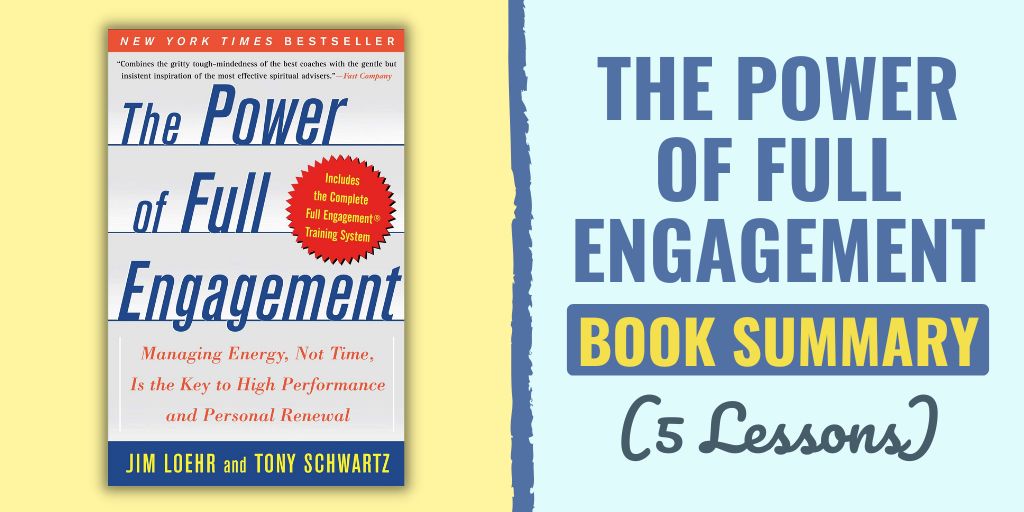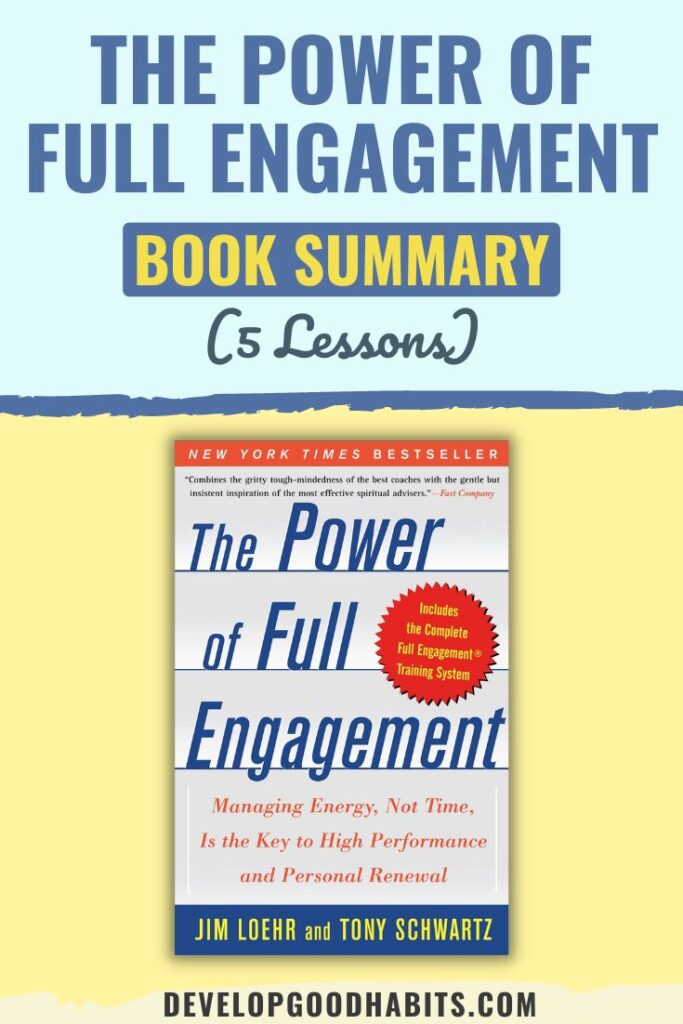There might be affiliate links on this page, which means we get a small commission of anything you buy. As an Amazon Associate we earn from qualifying purchases. Please do your own research before making any online purchase.
In today's fast-paced world, it can be difficult to balance your personal and professional life and maintain peak performance in both areas. If this sounds like you, it's time to explore “The Power of Full Engagement,” a transformative book by James E. Loehr and Tony Schwartz.
The authors draw from their extensive experience working with high-performing athletes, business leaders, and other professionals throughout the book. They reveal the secrets of effective energy management, helping you develop a systematic approach to maximizing your performance across all areas of your life.
With practical tips and rigorous research, “The Power of Full Engagement” will give you the tools you need to achieve a truly meaningful and fulfilling existence.
If you’d like to check out the book, you can read it on your Kindle, get a print copy, or listen to the audiobook.
In this article, we’ll delve into five lessons you can learn from James E. Loehr and Tony Schwartz's “The Power of Full Engagement.”
Lesson 1: An Overview
The book is based on three decades of research with world-class athletes, law enforcement officers, medical professionals, and business leaders. The core concept is that energy, not time, is the fundamental currency of high performance.
Since the number of hours in a day is fixed, it's essential to optimize the quantity and quality of energy available to you. To help you accomplish this, the authors provide various strategies for managing your energy levels, including establishing specific rituals.
The goal is to create a sustainable approach to work and life that allows you to consistently perform at peak levels while maintaining overall health and happiness.
An important aspect of the book is focusing on the four key sources of energy: physical, emotional, mental, and spiritual. By addressing each of these areas, you can create a more balanced and effective approach to managing your energy. Some of the methods include:
Remember that managing your energy doesn't mean you have to follow every single aspect of the book perfectly. It's a continuous process of learning and adapting to find what works best for you.
Lastly, don't forget that managing your energy is a skill that can be developed over time. Be open to experimenting with different techniques and strategies, and always strive for improvement.
Lesson 2: The Core Principles
In “The Power of Full Engagement,” authors James E. Loehr and Tony Schwartz emphasize that managing your energy, rather than time, is the key to high performance and personal renewal.
It's not about working longer hours; it's about working smarter by tapping into your energy reserves. Remember to take breaks, de-stress, and recharge to maintain peak performance throughout the day.
They also break energy into four separate categories to more easily apply the concepts they discuss.
Four Types of Energy
The book identifies four interconnected sources of energy that you need to manage for full engagement:
- Physical energy: Take care of your body by eating well, getting regular exercise, and obtaining sufficient sleep. Physical health directly impacts your ability to use other forms of energy.
- Emotional energy: Cultivate a positive attitude and strong relationships. Emotions affect your productivity and ability to manage stress.
- Mental energy: Improve focus, time management, and problem-solving skills. Mental energy empowers you to handle complex tasks and overcome obstacles.
- Spiritual energy: Align your actions with your values, purpose, and passions. Spiritual energy provides a sense of meaning and direction in your life.
Develop Positive Energy Rituals
Developing specific rituals to manage each of these energy types is crucial for maintaining full engagement. Here are some ideas:
- Physical rituals: Schedule regular exercise or breaks, prepare healthy meals/snacks, and establish a consistent sleep routine.
- Emotional rituals: Practice gratitude, connect with loved ones, or engage in activities that bring you joy and relaxation.
- Mental rituals: Set time aside for uninterrupted work, create to-do lists, or learn new strategies to enhance cognitive abilities.
- Spiritual rituals: Reflect on your values, engage in activities that align with your passions, or dedicate time for meditation or quiet reflection.
Incorporating these rituals into your daily life will help you manage your energy more effectively and ultimately lead to a more balanced, engaged, and productive life.
Lesson 3: Learning To Manage Your Energy for Full Engagement
As you may have noticed, the book breaks down energy into 4 categories – Physical, Emotional, Mental, and Spiritual. The strategies for managing your energy can differ slightly.
Physical Energy
To fully engage with your life and work, it's crucial to manage your physical energy effectively.
Aim to maintain a balanced diet, exercise regularly, and get enough sleep each night. By taking care of your body, you'll be better equipped to handle daily challenges and achieve your goals.
It's essential to listen to your body's signals and give it what it needs, allowing for both energy expenditure and renewal. Rest and recovery are just as crucial as activity, so be sure to balance both aspects of your physical energy.
Emotional Energy
Your emotional energy plays a significant role in your overall well-being and ability to engage fully in life.
To manage your emotional energy, develop healthy strategies for coping with stress, such as practicing mindfulness, deep breathing, or connecting with supportive friends and family.
Acknowledge your emotions, both positive and negative, but create boundaries to prevent them from overwhelming you. By cultivating a more balanced emotional life, you can access a fuller range of energy to perform at your best.
Mental Energy
Mental energy management means focusing your thoughts and cultivating a positive mindset.
You can develop mental resilience by challenging negative thought patterns and replacing them with more constructive beliefs. Establish priorities and set realistic goals to help guide your thoughts and actions.
Additionally, taking regular breaks throughout the day will help prevent mental fatigue and keep your mind sharp.
Spiritual Energy
Spiritual energy relates to your deeper sense of purpose, values, and beliefs.
Nurturing your spiritual energy can provide a sense of direction and motivation, especially during challenging times. To cultivate this energy, take time for self-reflection and ask yourself what truly matters to you.
Engage in activities that align with your values, such as volunteering or exploring creative pursuits. By connecting with your core values and beliefs, you can access a more profound source of energy to fuel your daily life and long-term goals.
Lesson 4: The Importance of Balancing Your Energy Levels
In The Power of Full Engagement, authors James E. Loehr and Tony Schwartz emphasize the importance of balancing energy expenditure and renewal. When you expend energy, you need to ensure you're also taking sufficient time to renew those energy sources.
To achieve this balance, focus on recognizing when your energy levels are low and taking appropriate breaks for rejuvenation. These breaks could include physical activities, such as a walk or stretching, or mental escapes, like a short mindful meditation.
By incorporating these regular pauses into your day, you'll be able to tackle challenges more effectively and sustain engagement for longer periods of time.
If you feel tired all the time, take a few minutes to watch the video below to find out the possible cause and how to manage it.
Creating Positive Rituals
Another key concept in The Power of Full Engagement is the importance of creating positive rituals. These rituals are habits that help you manage and renew your energy throughout the day.
By developing rituals that nourish your physical, emotional, mental, and spiritual energy, you'll be better equipped to perform at your best each day.
Some examples of positive rituals include:
By implementing these rituals into your daily routine, you'll be better equipped to manage your energy, enhance your performance, and ultimately find greater personal and professional satisfaction.
Lesson 5: Assessing Your Energy Levels
To effectively manage your energy, you need to first assess your energy levels. Here are some ways to evaluate your energy levels in each of these areas as recommended by James E. Loehr and Tony Schwartz:
Physical Energy
Emotional Energy
Mental Energy
Spiritual Energy
By assessing your energy levels in each of these domains, you can identify areas where you may need to create or adjust specific rituals to better manage your energy. This, in turn, will help you perform at your best and fully engage in every aspect of your life.
Final Thoughts on The Power of Full Engagement
The Power of Full Engagement by James E. Loehr and Tony Schwartz teaches you the importance of managing your energy to achieve success. By understanding and utilizing the four sources of energy—physical, emotional, mental, and spiritual—you can perform at your best in all aspects of life.
Overall, the book offers valuable insights and practical strategies to help you optimize your energy and achieve peak performance in every area of your life. Now that you've gained this knowledge, it's up to you to implement these tools and techniques to transform your life.
Now, as a reminder, if you’d like to check out the book, you can read it on your Kindle, get a print copy, or listen to the audiobook.
For book reviews and similar content, check out these articles:
Finally, if you want to take your goal-setting efforts to the next level, check out this FREE printable worksheet and a step-by-step process that will help you set effective SMART goals.



